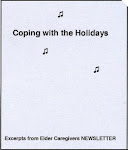National Healthcare
Decisions Day Set for April 16
April 16 is the 7th Annual National Healthcare
Decisions Day. The day is designed to
raise public awareness of the need to plan ahead for health care decisions
related to medical decision-making and end-of-life care whenever patients are
unable to speak for themselves and to encourage the specific use of advance
directives to communicate these important healthcare decisions so that fewer
families and health care providers have to struggle with making difficult
health care decisions in the absence of guidance from the patient.
An advance directive is a written document in the form of a
living will or durable power of attorney prepared by a competent
individual. It specifies your decisions
in the future regarding health care, end-of-life care, nutrition, hydration,
hospice care, No CPR and organ donation, when you become unable to express your
decisions.
According to the U.S. Department of Health and Human
Services, “Advance Directives and Advance Care Planning Report to Congress,”
August 2008: “it is estimated that 18 to
36 percent of Americans have executed an advance directive. Fewer than half of severely or terminally ill
patients have an advance directive.
Two-thirds of physicians whose patients had advance directives were
unaware of the existence of those documents.”
(http://aspe.hhs.gov/daltcp/reports/2008/ADCongRpt.htm)
Advance Directives are of such importance I have submitted a
request for a Mayoral Proclamation for the Healthcare Decisions Day in San
Francisco; and, asked the City Librarian to include libraries citywide in
acknowledging the day with books display the week of April 9 through April 16.
Prepare for the unexpected.
Set aside time on April 16—visit the library; discuss your wishes with
your loved ones, primary care physician, or attorney. Name someone to speak for you when you cannot
speak for yourself.
Mattyee
Elder Care Consultant
Advocate, National Healthcare Decisions Day
___________________________________________________________________
Healthcare Decisions Day Proclamation
WHEREAS,
Healthcare Decisions Day
is designed to raise public awareness of the need to plan ahead for health care
decisions related to medical decision-making and end of life care whenever
patients are unable to speak for themselves and to encourage the specific use
of advance directives to communicate these important health care decisions; and
WHEREAS, your agent whom you named in
your Advance Health Care Directives will have the authority—in writing—to
discuss your situation with your doctor, ask for and receive medical reports,
relate your concerns to the doctors and hospital personnel and make the kind of
decisions you would want made about your health care, including end of life
care, nutrition, hydration, hospice care, No Cardiopulmonary Resuscitation, and
organ donation; and
WHEREAS, it is estimated that 18 to 36
percent of Americans have executed an advance directive. Moreover, it is estimated that fewer than
half of severely or terminally ill patients have an advance directive; and
WHEREAS, one of the principal goals of Healthcare Decisions Day is to encourage
health care facilities to participate in a statewide effort to provide clear
and consistent information to the public about advance directives, as well as
to encourage health care professionals and lawyers to volunteer their time and
efforts to improve public knowledge and increase the number of citizens with
advance directives; and
WHEREAS, as a result of April 16, 2014,
being recognized as Healthcare Decisions
Day in San Francisco, more citizens will have conversations about their
health care decisions; more citizens will execute Advance Directives to make
their wishes known; and fewer families and health care providers will have to
struggle with making difficult health care decisions in the absence of guidance
from the patient;
THEREFORE, I, , do hereby
recognize April 16, 2014, as HEALTHCARE
DECISIONS DAY in San Francisco, and I call this observance to the attention
of all our citizens.
Submitted
March 6, 2014 to Mayor Ed Lee
©2014












